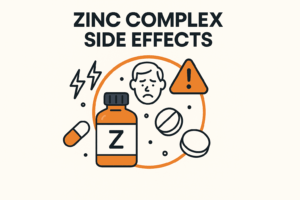Communicating clearly about weight loss supplements can be challenging, given the abundance of conflicting information online. Patients often arrive at appointments already exposed to social media claims, diet trends, or misinformation.
These influences can affect how they view supplements, sometimes with false hope, and other times with hesitation or skepticism.
Patient education on supplements plays an important role in guiding them toward safe, informed choices. When patients have the right information, they’re more likely to follow treatment plans, ask questions, and feel supported in their health journey. This is especially important when encouraging patient compliance with supplements that support weight management.
Why Patient Education on Supplements Matters
When patients feel included, heard, and respected in conversations about their care, they are more likely to trust the recommendations they’re given. [1] That trust can shape how they approach treatment, especially when considering weight loss supplements.
Moreover, providing clear information helps:
- Correct common myths: For example, the idea that supplements can “melt fat” without lifestyle changes
- Prevent unrealistic expectations: Setting appropriate timelines and outcomes reduces frustration
- Support long-term commitment: Patients are more likely to stay consistent when they understand why something matters
- Encourage open dialogue: Educating patients on weight loss supplements can lead to better follow-up conversations and transparency about side effects or concerns
What Patients Need to Know About Weight Loss Supplements
Sharing the right information at the right time helps patients make safe, confident decisions. Below are key points to cover during consultations or in educational materials.
Supplements Support, They Don’t Replace
Supplements can be useful tools when paired with healthy habits. [2] They should not be viewed as a replacement for a balanced diet, physical activity, or other evidence-based lifestyle changes. It’s important to frame them as part of a bigger picture—one that includes nutrition, movement, sleep, and stress care.
Potential Benefits
Weight loss supplements may work in several ways:
- Some contain ingredients that may temporarily boost energy or metabolism.
- Others support appetite control or reducing fat absorption.
- A few may help regulate blood sugar, which can assist with weight management when paired with dietary changes.
Patients should understand that results can vary and depend on consistent use, lifestyle factors, and individual biology.
Risks and Safety
Supplements may be available over the counter, but that doesn’t mean they are risk-free. It’s helpful to educate patients on: [3]
- Possible side effects, such as nausea, headaches, or jitteriness
- More serious risks, like elevated blood pressure or medication interactions
- The importance of disclosing any other medications or supplements they are using
FDA Oversight and Product Quality
Patients may not realize that supplements are regulated differently from prescription medications. The U.S. Food and Drug Administration (FDA) does not test all supplements for safety or effectiveness before they reach the market. That’s why choosing high-quality products matters.
Educating patients about what pharmaceutical-grade means can help clarify why these products are different from those they might find on store shelves.
When a supplement is labeled pharmaceutical grade, it refers to products made under rigorous production requirements. These supplements are manufactured in facilities that follow Current Good Manufacturing Practice (CGMP) guidelines, which are enforced by the FDA. [4] At Legere Pharmaceuticals, we offer pharmaceutical-grade supplements that are manufactured under strict quality and purity standards. Legere is both National Science Foundation (NSF) Certified and cGMP compliant, and operates in an FDA-registered facility.
The Importance of a Healthcare Professional’s Input
Some patients turn to online reviews or influencers for guidance. These sources often lack medical context. Encourage patients to speak openly about their supplement use so you can provide personalized recommendations and guidance on proper timing and dosage.
Even well-intentioned patients can make risky choices without support. Supplement education for doctors is equally important, as it ensures providers feel equipped to offer up-to-date, evidence-informed advice.
Effective Education Strategies for Better Patient Support
Effective patient education on supplements doesn’t happen in a single conversation. It often requires repetition, visual tools, and follow-up support. Practices that invest in different formats of communication tend to see better engagement and understanding from their patients.
Everyone learns differently. Some patients respond well to visuals, while others prefer written materials. Consider using:
- Brochures or one-pagers summarizing supplement benefits and instructions
- Short videos explaining how and when to take supplements
- Printed FAQs addressing common concerns or myths
- Follow-up calls or portal messages to check on progress and answer questions
Legere’s Educational Resources for Practices
Partnering with Legere Pharmaceuticals means you’ll gain access to a range of materials to support your supplement education process, including:
- White papers and reports based on current research
- Step-by-step videos and webinars for both providers and patients
- Marketing tools that help explain your practice-branded supplements
- Clinical insights and best practices from healthcare providers already using Legere products
These resources can be shared in-office or electronically, giving patients access to trusted information whenever they need it.
Addressing Common Concerns and Improving Supplement Communication
Patients often have valid questions about weight loss supplements. Taking time to explain these common concerns can lead to better understanding and stronger trust. These include worries about costs or long-term availability, doubts about whether weight loss supplements actually help, and the fear of side effects.
Here are some tips when supporting their daily use:
- Suggest tying supplement use to an existing habit
- Offer tracking tools like checklists or reminders
- Review dosage instructions clearly
- Recommend keeping products in a visible, safe spot
Wrapping Up: Small Conversations, Meaningful Results
Improving patient education on supplements, especially weight loss supplements, starts with care, clarity, and consistency. It’s not about having all the answers at once, but about building trust and offering the kind of guidance patients can return to when questions or doubts come up.
Healthcare providers can make a lasting difference by:
- Focusing on supplement education for doctors within their own practice teams
- Using tools that simplify weight loss supplement communication
- Offering clear, nonjudgmental education that improves patient compliance with supplements over time
Legere Pharmaceuticals offers helpful resources to support these goals, including provider-focused tools, patient-facing education materials, and evidence-based white papers. These can help strengthen your conversations and provide ongoing support for both your patients and your practice.
For access to these materials or to learn more about how we at Legere support supplement-based care, feel free to contact us today. You can also explore the provider education tools and blog posts available on our website.
Sources:
1 – Authenticx. (n.d.). Why is active listening important in healthcare? Authenticx. https://authenticx.com/page/why-is-active-listening-important-in-healthcare/#
2 – Mayo Clinic. (2024, June 18). Dietary supplements for weight loss. https://www.mayoclinic.org/healthy-lifestyle/weight-loss/in-depth/weight-loss/art-20046409
3 – U.S. Department of Health & Human Services, National Institutes of Health. (2023, January 4). Dietary supplements: What you need to know. https://ods.od.nih.gov/factsheets/WYNTK-Consumer/
4 – U.S. Food and Drug Administration. (2025, January 21). Facts about the current good manufacturing practice (CGMP). https://www.fda.gov/drugs/pharmaceutical-quality-resources/facts-about-current-good-manufacturing-practice-cgmp




